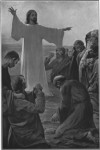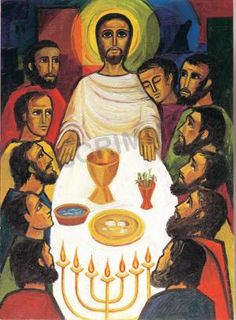From Matthew 26
 Jesus knew in advance what was going to happen to him in Jerusalem. He didn’t try to escape his fate. He embraced it. In today’s passage we look at the Passover meal. The last meal Jesus shared with his disciples before he was arrested and taken to the cross.
Jesus knew in advance what was going to happen to him in Jerusalem. He didn’t try to escape his fate. He embraced it. In today’s passage we look at the Passover meal. The last meal Jesus shared with his disciples before he was arrested and taken to the cross.
This post is part of my bible in a year series.
Passage and Comments
Judas has just gone to the chief priests and agreed to betray Jesus. They will want to know when there are no crowd around so they can arrest him without a major fight. After Judas makes the deal he returns to Jesus, with the other disciples none the wiser (Mt 26.14-16). Judas’ betrayal, the Passover and the cross are all coming together.
17 Now on the first day of Unleavened Bread the disciples came to Jesus, saying, “Where will you have us prepare for you to eat the Passover?”
18 He said, “Go into the city to a certain man and say to him, ‘The Teacher says, My time is at hand. I will keep the Passover at your house with my disciples.’ ”
19 And the disciples did as Jesus had directed them, and they prepared the Passover. (Mt 26.17-19)
It’s ‘the first day of unleavened bread‘. The week long festival which begins with the night time Passover feast commemorating Israel’s rescue from Egyptian slavery and birth as a nation.
‘My time is at hand’. Jesus knows his fate. He knows what is going to happen to him.
How would you feel knowing the time you would die?
This is no normal Passover for him. Things are being setup as planned, he only needs to walk the path.
20 When it was evening, he reclined at table with the twelve. 21 And as they were eating, he said, “Truly, I say to you, one of you will betray me.”
22 And they were very sorrowful and began to say to him one after another, “Is it I, Lord?”
23 He answered, “He who has dipped his hand in the dish with me will betray me.
24 The Son of Man goes as it is written of him, but woe to that man by whom the Son of Man is betrayed! It would have been better for that man if he had not been born.”
25 Judas, who would betray him, answered, “Is it I, Rabbi?” He said to him, “You have said so.” (Mt 26.20-25)
‘One of you will betray me‘. Jesus drops a bomb on his disciples. Having spent the last three or so years with Jesus they are understandably sorrowful. They do not deny it will happen, but they do not know who it is. Each of them even consider the possibility it might themselves and they do not know it yet. So they ask, ‘Is it I Lord?’
Jesus says he has dipped his hand in the same dish with him is the one. I think they all have been sharing the same dish. We see in another gospel, Judas then dips into the same dish.
‘The Son of Man goes as it is written of him‘. Jesus knows his fate. He knows what is going to happen to him.
How would you feel knowing the scriptures predicted your betrayal and death? Would you want to go through with it? Why do you think Jesus did?
It is predicted in the scriptures. There is this sense of an inexorable fate. Jesus knows the scriptures point to him. He knows what they say of him. He knows what is about to happen to him.
‘You have said so‘. Jesus knows Judas is the one who has betrayed him. He will let him go for now, knowing his punishment awaits him.
26 Now as they were eating, Jesus took bread, and after blessing it broke it and gave it to the disciples, and said, “Take, eat; this is my body.” 27 And he took a cup, and when he had given thanks he gave it to them, saying, “Drink of it, all of you, 28 for this is my blood of the covenant, which is poured out for many for the forgiveness of sins. 29 I tell you I will not drink again of this fruit of the vine until that day when I drink it new with you in my Father’s kingdom.”(Mt 26.26-29)
“The author of Matthew gives no extended explanation of the bread and wine, probably because the meal was celebrated in his community and was already understood by his audience.
In the context of the Passover festival, the symbols “body and blood” refer to the Passover lamb or goat which was sacrificed to God and then eaten in each household (Ex 12:1–13; cf. Lev 11:18 for the consumption of sacrifices).
In the Gospel narrative the meal transforms Jesus’ tragic execution by the imperial government into a religious sacrifice and links Jesus’ self-sacrifice with the sacrifices and sprinkling of blood at the ceremony validating the Sinai covenant (Ex 24:3–8) and with biblical sacrifices which forgive sins (26:28; Lev 4–5).” (Saldarini, A.J., 2003. Matthew. In J. D. G. Dunn & J. W. Rogerson, eds. Eerdmans Commentary on the Bible. Grand Rapids, MI; Cambridge, U.K.: William B. Eerdmans Publishing Company, pp. 1056–1057.)
About Jesus
Jesus in the Passover meal gives a series of instructions for later practice:
- “Take” (26.26) – Jesus took the bread.
- “Bless” (26.26) – Jesus blessed the bread.
- “Break” (26.26) – Jesus broke the bread.
- “Give” (26.26) – Jesus gave the bread.
The bread is his body. Broken for us.
- “Take” (26.27) – Jesus took the cup.
- “Thank” (26.27) – Jesus gave thanks.
- “Give” (26.27) – Jesus gave the cup.
The cup of wine is his blood. Spilt for us.
Jesus did all these things so we could be part of the new covenant and receive forgiveness of sins.
This is why Jesus knowingly went to his death. He did it for us.
Copyright © Joshua Washington and thescripturesays, 2016. All Rights Reserved.


